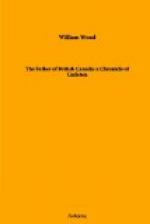Foreign complications were thickening fast. The French Revolution had already begun, though its effect was not yet felt in Canada. The American government was anxiously watching its refractory states, while an anti-British political party was making headway in the South. As if this was not enough to engage whatever attention Carleton had to spare from the internal affairs of Canada, he suddenly heard that the Spaniards had been seizing British vessels trading to a British post on Vancouver Island. [Footnote: See Pioneers of the Pacific Coast in this Series.] This Nootka Affair, which nearly brought on a war with Spain in 1790, was settled in London and Madrid. But the threat of war added to Carleton’s anxieties.
Meanwhile the governor was busily employed with an immigration problem. It was desirable that the English-speaking immigrants should settle on the land with the least possible friction between them and the French Canadians. The French Canadians differed among themselves. But no such differences brought them any closer to their new neighbours on questions of land settlement. The French had granted lands in seigneuries. The British would hear of nothing but free and common socage. French farms were measured by the arpent and were staked out in long and narrow oblongs. British farms were measured by the acre and staked out ‘on the square.’ Language, laws, religion, manners and customs, ways of life, were also different. So there was hardly any intermixture of settlements. The French Canadians




